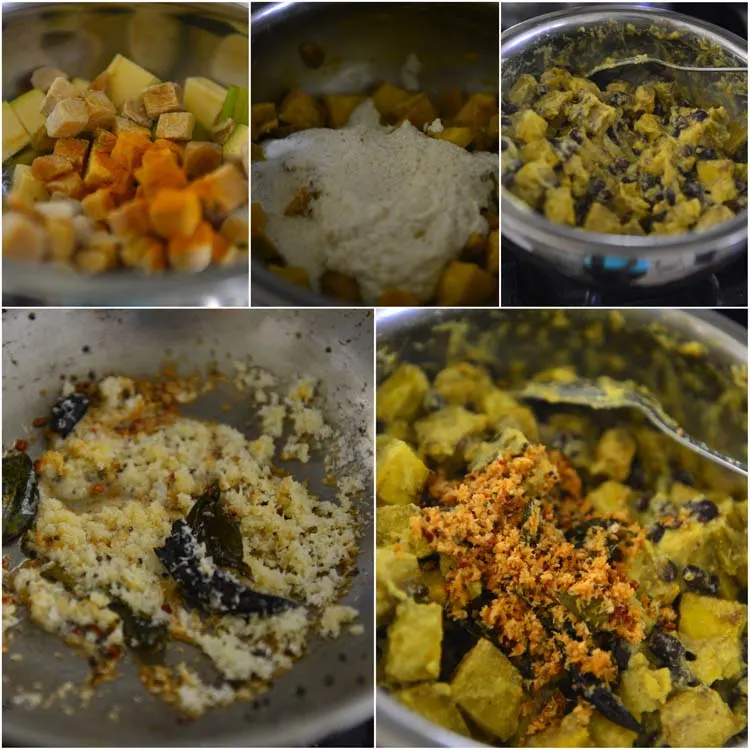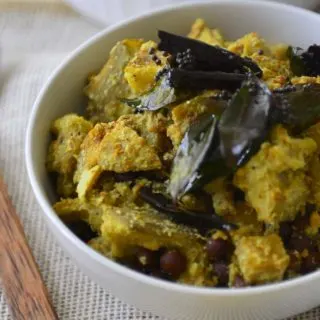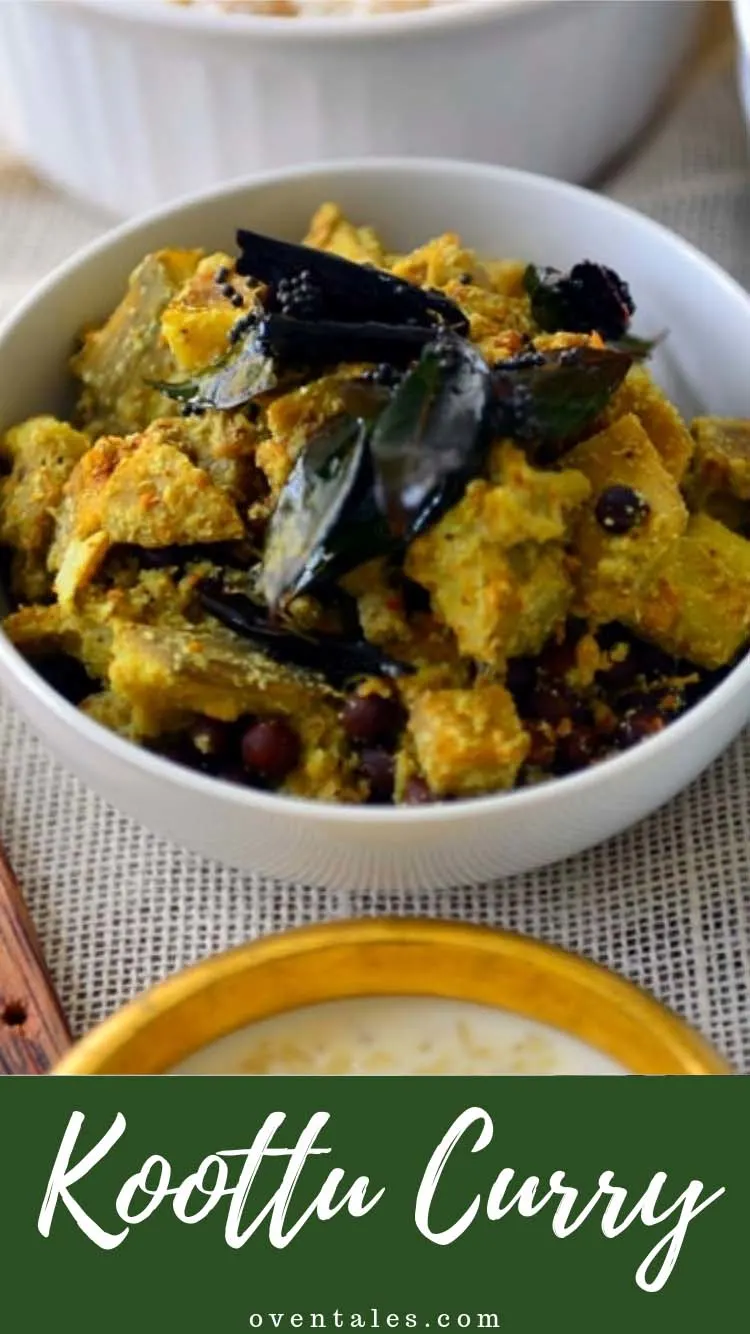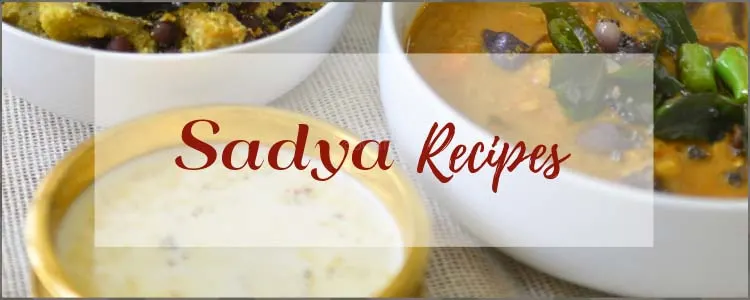This is koottu Curry, more popular in the Malabar region than in south Kerala. But it still has a prominent place in the Sadya menu all over. Koottu curry literally means a curry made with a mix, and as such has many different regional interpretations. My dad makes one with potatoes, <mystery vegetable here> , and tomatoes. I am not sure how he does it , as he makes it only when he has complete freedom in the kitchen – in other words when none of us are butting in 😉 .

His interpretation of this dish is different from mom’s , but none the less delicious. His version is also vastly different from the koottu Curry served in sadya. The sadya version is made with a one or more starchy vegetables and a bean like chick peas, or cow peas. It is neither an “ozhichu curry” meaning that the is no gravy to pour, it nor is it a ‘thoran’ or a kind of stir fry.
The traditional south Indian sadya for religious and other occasions is vegetarian. It is not surprising to find many lentil/bean based dishes on the sadya menu as these are the main source of protein. Beans can also be very varied in terms of taste and textures not to mention delicious.
I like these kind of dishes as there is a nice balance of protein, minerals and fiber here. If you have read some of my posts you might realize that I tend to prefer easy meals. So definitely a dish like this, that can be served with a bowl of rice or some flat breads and call it a meal, makes me very happy.
Koottu curry is by no means the only bean and vegetable combination in the sadya menu. There is a sweeter version Pumpkin Erisseri , and a very mellow one olan . There is a common theme in all these 3 dishes – a vegetable usually in the gourd family a bean and coconut. Surprisingly these three combine to give very different flavors to each dish .
With there being a wide variety of bean dishes in the Indian cuisine it is not surprising that people have their favorites. For my family it is Parippu and not Koottu Curry. So I make this rarely that too usually for Onam and Vishu.

So here are the steps to this koottu curry.
- Cook the vegetables with a little salt and turmeric.
- Add the spiced coconut paste and black chickpeas.
- Mix cook a little
- Season with the roasted coconut and spices !
Sounds simple doesn’t it ? It indeed is. The layering of flavors is what gives it the characteristic smoky, spicy taste.
Give it a try, and of course don’t hesitate to experiment – I am sure you too will find some bean and veggie combos to your liking .

Kootu Curry For Sadya
Ingredients
- 1 Raw plantain Medium sized
- 1 C Elephant Yam Cubed
- 1 C Black Chickpeas Cooked
- 1 Tsp Chilly Powder To Taste
- 1/2 Tsp Turmeric powder
- Few Curry Leaves
- Salt To taste
To Grind To Paste
- 1 C Grated Coconut
- 1 Tsp Whole Pepper Corns
- 1/2 Tsp Cumin Seeds
- 1/2 Tsp Minced Ginger Optional
To season
- 1/2 Tsp Mustard Seeds
- 2 - 3 Dry Red Chilies
- 1 Sprig Curry Leaves
- 1/2 - 3/4 C Grated Coconut
- 5 Whole Black Pepper Crushed
- 1 Tbsp Coconut oil
Instructions
- Cut the vegetables are into 1/2 inch thick pieces. Add to the pan along with 1 C water a pinch of salt and turmeric . Cook covered over medium heat for 5 to 10 minutes.
- While the vegetables are cooking, add all the ingredients for grinding to a blender bowl and grind to a smooth paste adding a few tablespoons of water as necessary .
- Add the chickpeas to the vegetables. Check the vegetables to see if they are almost cooked through. If needed cook for a few more minutes. Add the coconut paste mix and adjust salt.
- Reduce heat to low and cook for a few minutes until the raw smell goes away.
- In a small frying pan heat 1 tbsp oil. When hot add the mustard seeds, curry leaves, and red chilies. Once the mustard seeds crackle add the grated coconut. Stir fry the coconut until it turns uniformly brown. Add the crushed pepper, stir and turn off the heat.
- Check the vegetables to make sure that it is cooked through. Taste and adjust salt if needed. If needed continue cooking the vegetables for a few more minutes. Pour the coconut seasoning over the cooked vegetables and turn off the heat.
- Mix just before serving.
Notes
- You could add a few pearl onions while grinding or while frying the seasonings.
- Sometimes elephant yams take long to cook .
- Though black chickpeas are the most often used bean in this recipe you could substitute cow peas or pigeon peas.
Important: Nutrition Values are estimates. Actuals vary based on ingredients and serving size.

If you try this recipe, I would love to hear about it ! Leave a COMMENT, RATING , share a photo and TAG me on INSTAGRAM, FACEBOOK OR GOOGLE+
YOU MIGHT LIKE

